Global Business Environment: Digital Tech and Globalisation
VerifiedAdded on 2023/06/14
|14
|1258
|373
Report
AI Summary
This report provides a comprehensive analysis of the global business environment, focusing on the concept of globalisation, its key driving factors, and the impact of digital technology. It includes a PESTEL analysis to evaluate external environmental factors affecting businesses like SASOL Limited, covering political, economic, social, technological, environmental, and legal aspects. The report identifies technological, market, cost, and competition drivers of globalisation and discusses challenges such as difficulties in global expansion, international recruitment, compliance issues, and tariffs. Recommendations are provided to overcome these challenges, emphasizing the importance of financial planning and effective international recruitment strategies. The report concludes by highlighting the need for companies to formulate strategies for international recruitment, considering cultural differences, language barriers, and salary preferences. Desklib offers a wide range of solved assignments and study tools for students.
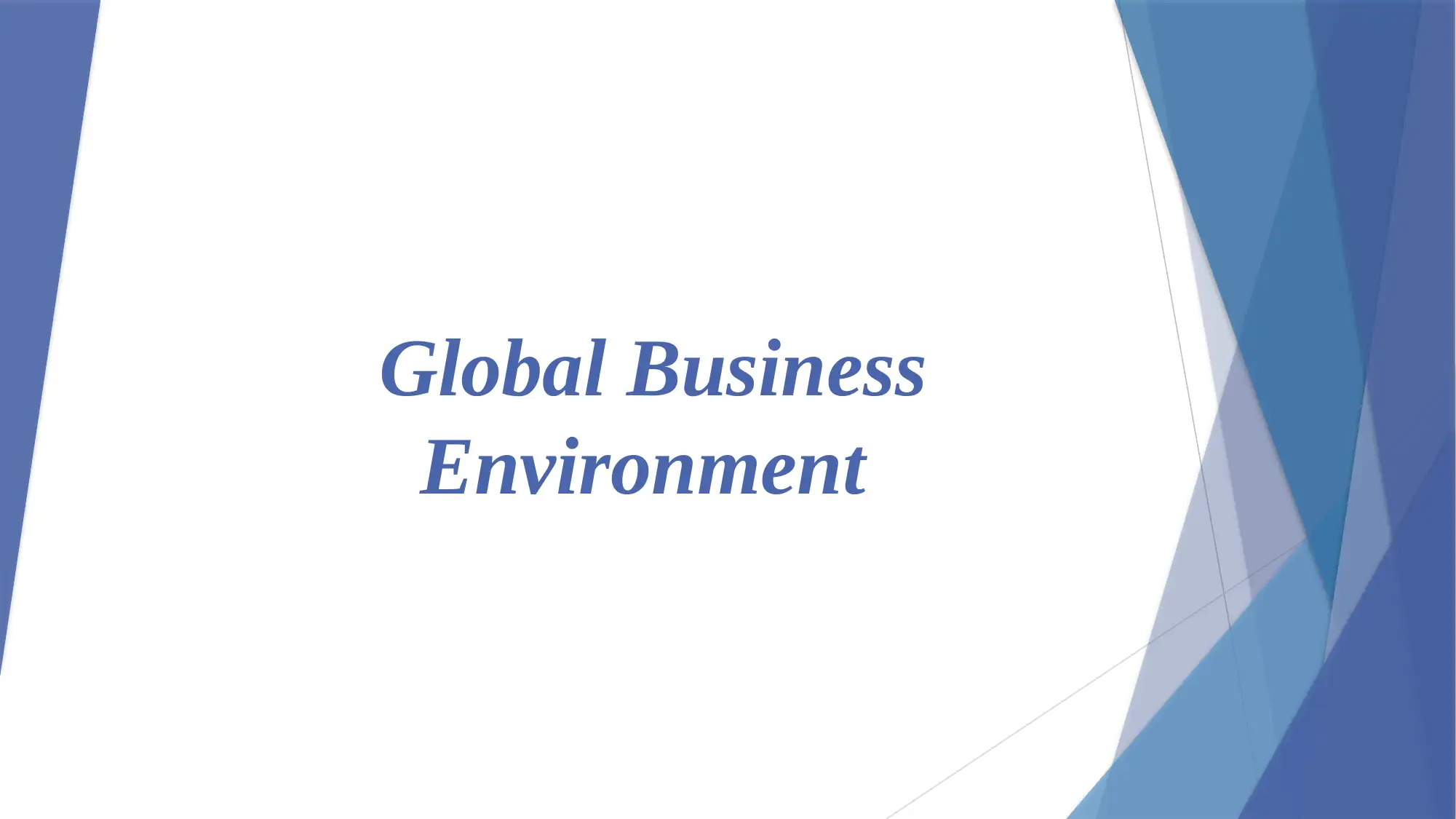
Global Business
Environment
Environment
Paraphrase This Document
Need a fresh take? Get an instant paraphrase of this document with our AI Paraphraser
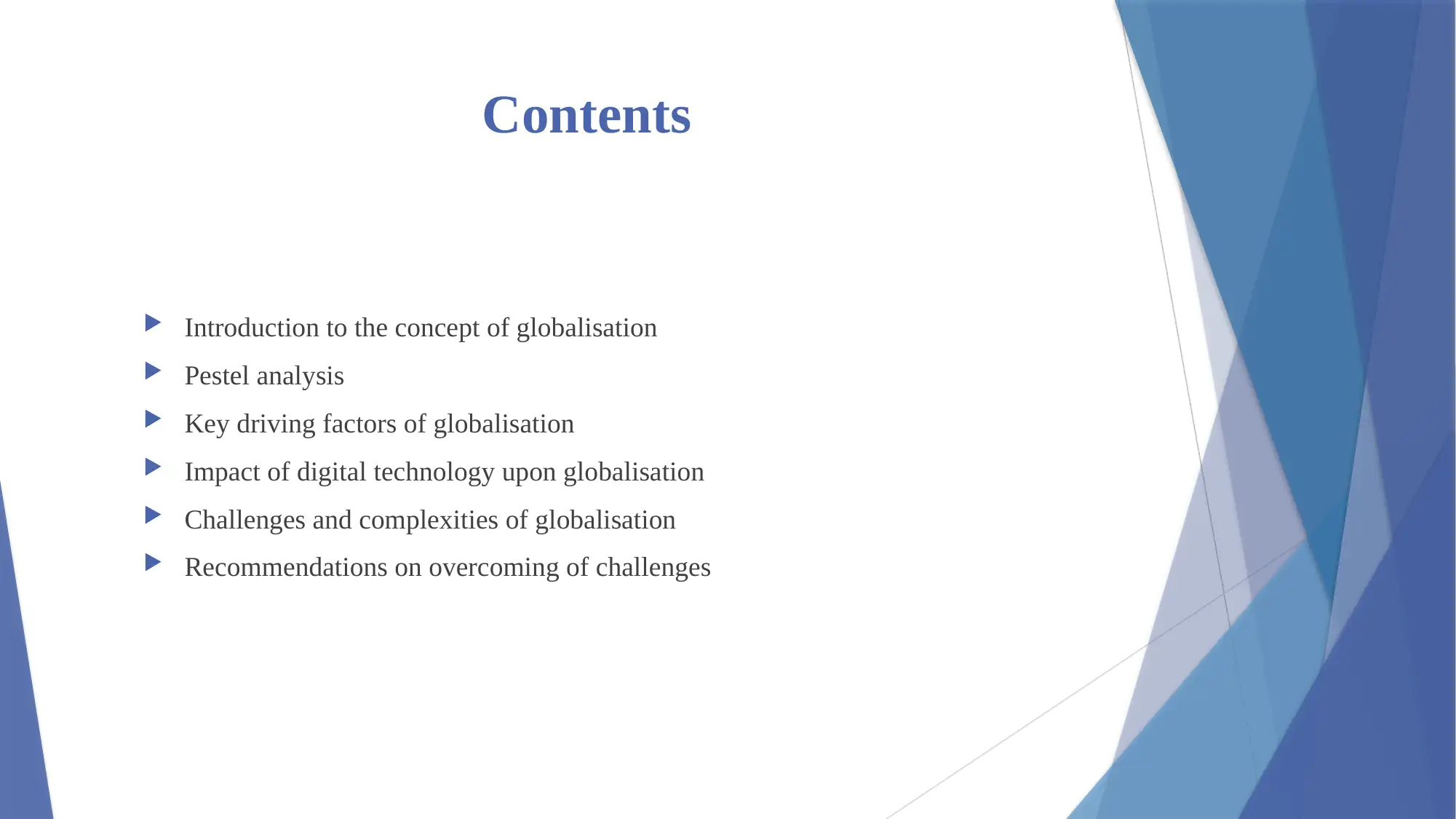
Contents
Introduction to the concept of globalisation
Pestel analysis
Key driving factors of globalisation
Impact of digital technology upon globalisation
Challenges and complexities of globalisation
Recommendations on overcoming of challenges
Introduction to the concept of globalisation
Pestel analysis
Key driving factors of globalisation
Impact of digital technology upon globalisation
Challenges and complexities of globalisation
Recommendations on overcoming of challenges
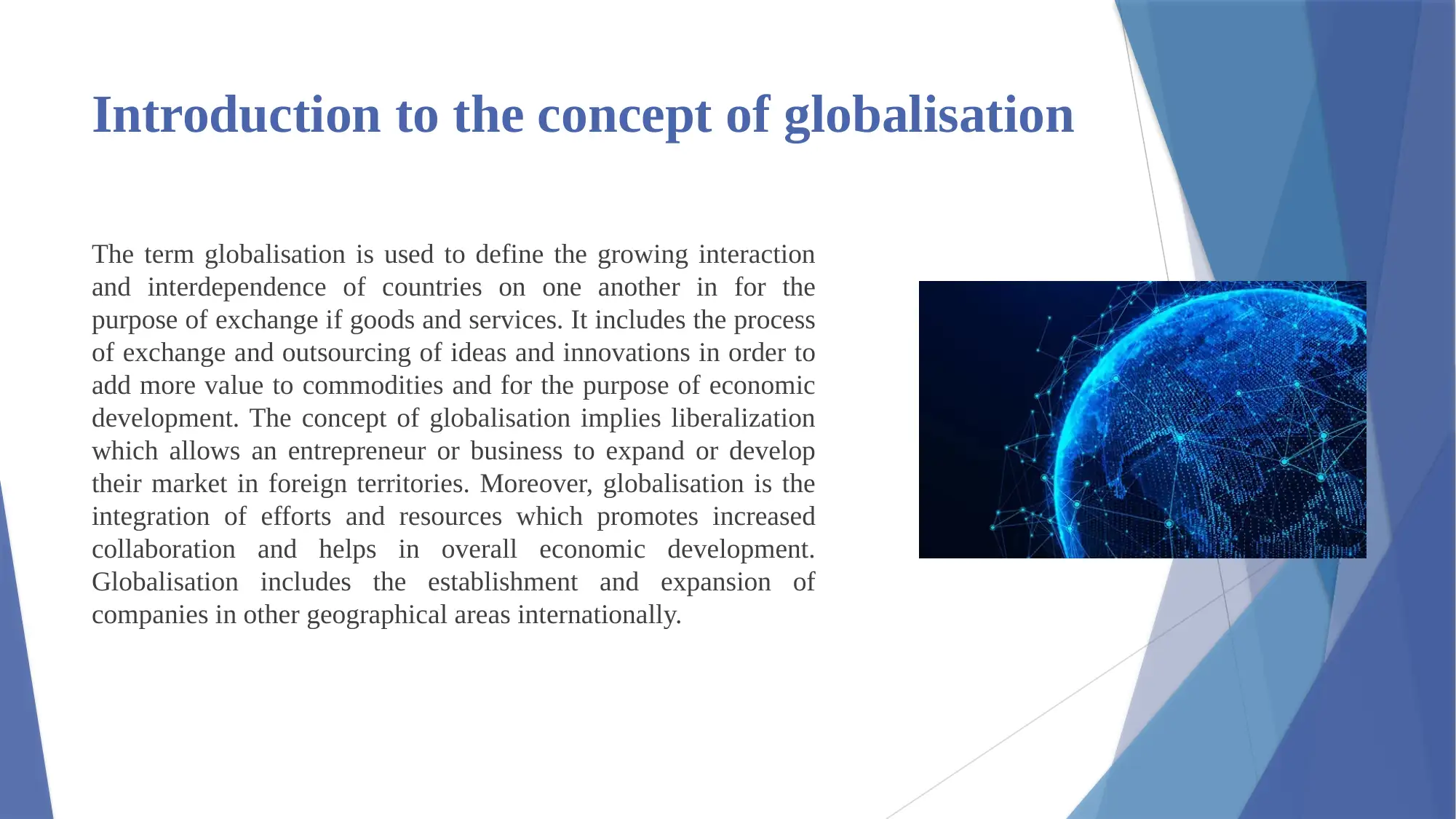
Introduction to the concept of globalisation
The term globalisation is used to define the growing interaction
and interdependence of countries on one another in for the
purpose of exchange if goods and services. It includes the process
of exchange and outsourcing of ideas and innovations in order to
add more value to commodities and for the purpose of economic
development. The concept of globalisation implies liberalization
which allows an entrepreneur or business to expand or develop
their market in foreign territories. Moreover, globalisation is the
integration of efforts and resources which promotes increased
collaboration and helps in overall economic development.
Globalisation includes the establishment and expansion of
companies in other geographical areas internationally.
The term globalisation is used to define the growing interaction
and interdependence of countries on one another in for the
purpose of exchange if goods and services. It includes the process
of exchange and outsourcing of ideas and innovations in order to
add more value to commodities and for the purpose of economic
development. The concept of globalisation implies liberalization
which allows an entrepreneur or business to expand or develop
their market in foreign territories. Moreover, globalisation is the
integration of efforts and resources which promotes increased
collaboration and helps in overall economic development.
Globalisation includes the establishment and expansion of
companies in other geographical areas internationally.
⊘ This is a preview!⊘
Do you want full access?
Subscribe today to unlock all pages.

Trusted by 1+ million students worldwide
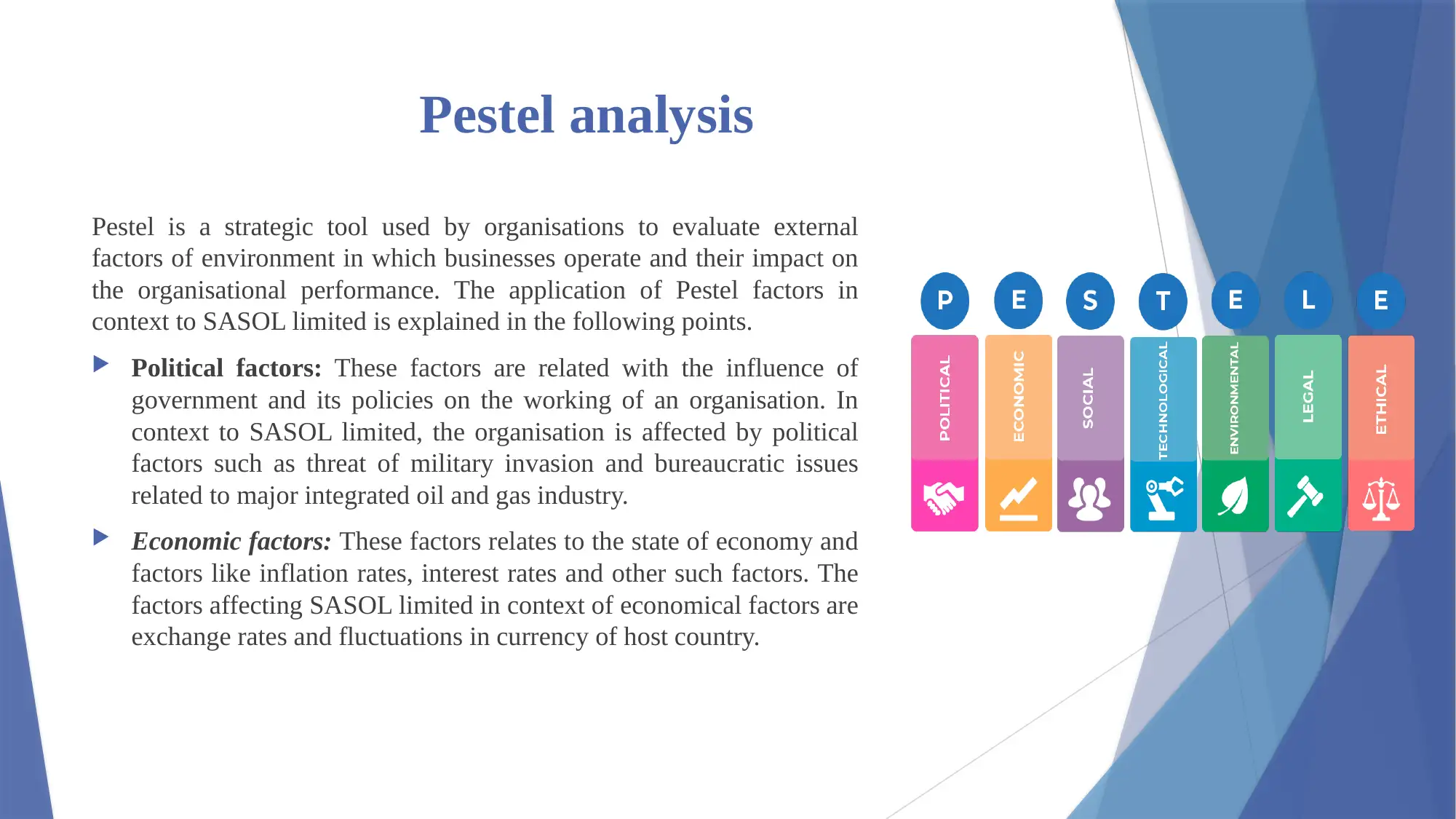
Pestel analysis
Pestel is a strategic tool used by organisations to evaluate external
factors of environment in which businesses operate and their impact on
the organisational performance. The application of Pestel factors in
context to SASOL limited is explained in the following points.
Political factors: These factors are related with the influence of
government and its policies on the working of an organisation. In
context to SASOL limited, the organisation is affected by political
factors such as threat of military invasion and bureaucratic issues
related to major integrated oil and gas industry.
Economic factors: These factors relates to the state of economy and
factors like inflation rates, interest rates and other such factors. The
factors affecting SASOL limited in context of economical factors are
exchange rates and fluctuations in currency of host country.
Pestel is a strategic tool used by organisations to evaluate external
factors of environment in which businesses operate and their impact on
the organisational performance. The application of Pestel factors in
context to SASOL limited is explained in the following points.
Political factors: These factors are related with the influence of
government and its policies on the working of an organisation. In
context to SASOL limited, the organisation is affected by political
factors such as threat of military invasion and bureaucratic issues
related to major integrated oil and gas industry.
Economic factors: These factors relates to the state of economy and
factors like inflation rates, interest rates and other such factors. The
factors affecting SASOL limited in context of economical factors are
exchange rates and fluctuations in currency of host country.
Paraphrase This Document
Need a fresh take? Get an instant paraphrase of this document with our AI Paraphraser
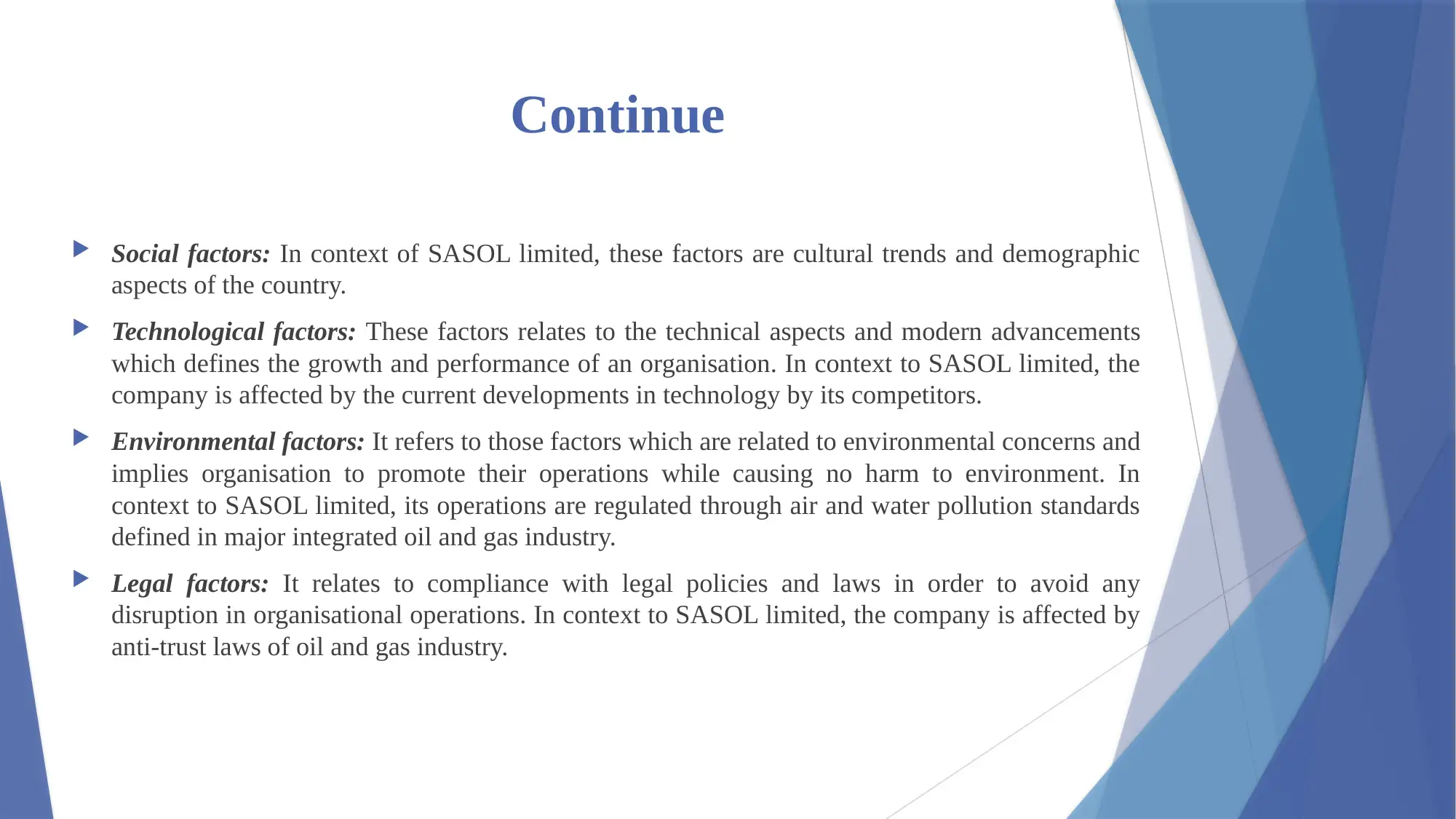
Continue
Social factors: In context of SASOL limited, these factors are cultural trends and demographic
aspects of the country.
Technological factors: These factors relates to the technical aspects and modern advancements
which defines the growth and performance of an organisation. In context to SASOL limited, the
company is affected by the current developments in technology by its competitors.
Environmental factors: It refers to those factors which are related to environmental concerns and
implies organisation to promote their operations while causing no harm to environment. In
context to SASOL limited, its operations are regulated through air and water pollution standards
defined in major integrated oil and gas industry.
Legal factors: It relates to compliance with legal policies and laws in order to avoid any
disruption in organisational operations. In context to SASOL limited, the company is affected by
anti-trust laws of oil and gas industry.
Social factors: In context of SASOL limited, these factors are cultural trends and demographic
aspects of the country.
Technological factors: These factors relates to the technical aspects and modern advancements
which defines the growth and performance of an organisation. In context to SASOL limited, the
company is affected by the current developments in technology by its competitors.
Environmental factors: It refers to those factors which are related to environmental concerns and
implies organisation to promote their operations while causing no harm to environment. In
context to SASOL limited, its operations are regulated through air and water pollution standards
defined in major integrated oil and gas industry.
Legal factors: It relates to compliance with legal policies and laws in order to avoid any
disruption in organisational operations. In context to SASOL limited, the company is affected by
anti-trust laws of oil and gas industry.
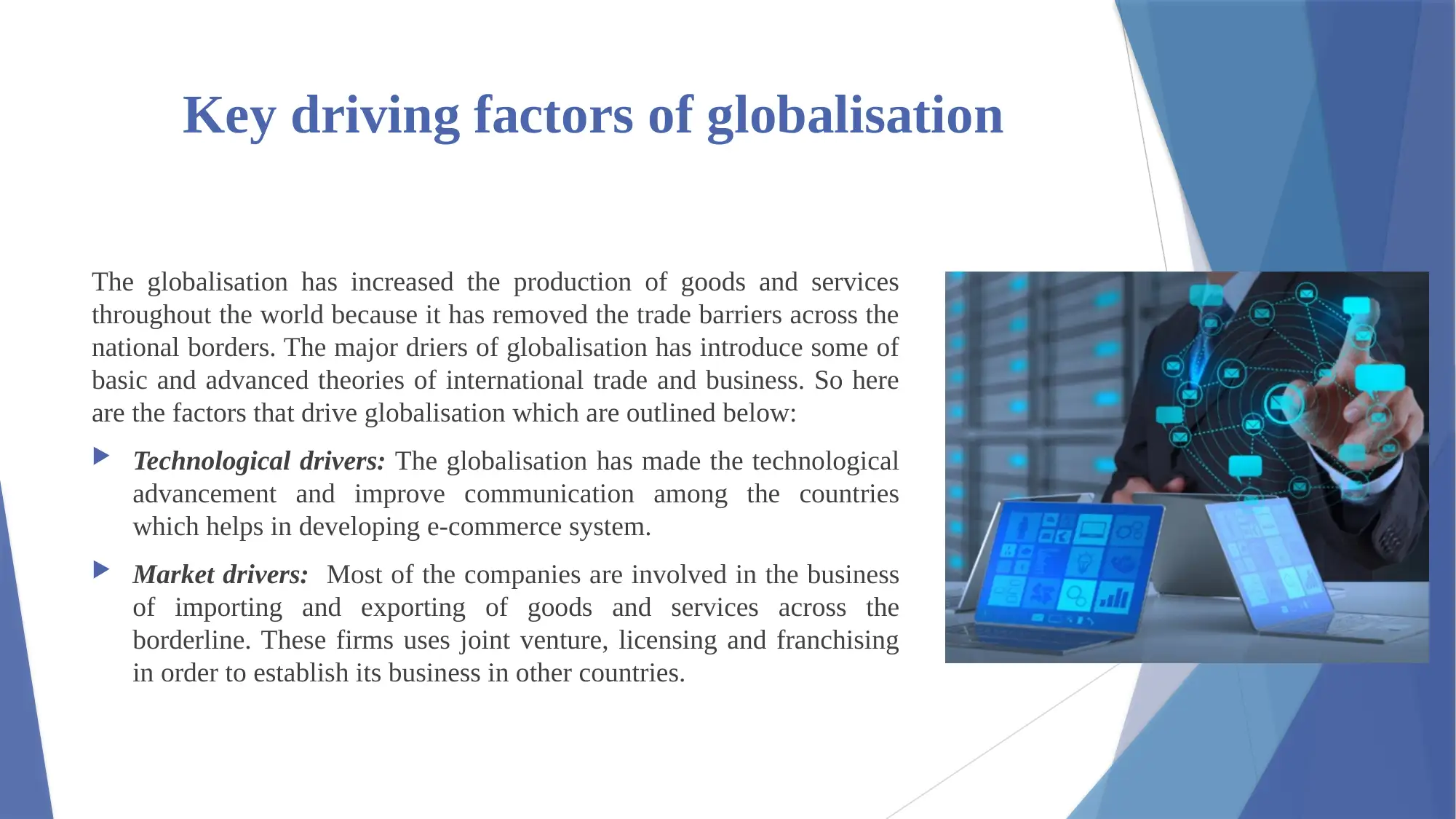
Key driving factors of globalisation
The globalisation has increased the production of goods and services
throughout the world because it has removed the trade barriers across the
national borders. The major driers of globalisation has introduce some of
basic and advanced theories of international trade and business. So here
are the factors that drive globalisation which are outlined below:
Technological drivers: The globalisation has made the technological
advancement and improve communication among the countries
which helps in developing e-commerce system.
Market drivers: Most of the companies are involved in the business
of importing and exporting of goods and services across the
borderline. These firms uses joint venture, licensing and franchising
in order to establish its business in other countries.
The globalisation has increased the production of goods and services
throughout the world because it has removed the trade barriers across the
national borders. The major driers of globalisation has introduce some of
basic and advanced theories of international trade and business. So here
are the factors that drive globalisation which are outlined below:
Technological drivers: The globalisation has made the technological
advancement and improve communication among the countries
which helps in developing e-commerce system.
Market drivers: Most of the companies are involved in the business
of importing and exporting of goods and services across the
borderline. These firms uses joint venture, licensing and franchising
in order to establish its business in other countries.
⊘ This is a preview!⊘
Do you want full access?
Subscribe today to unlock all pages.

Trusted by 1+ million students worldwide
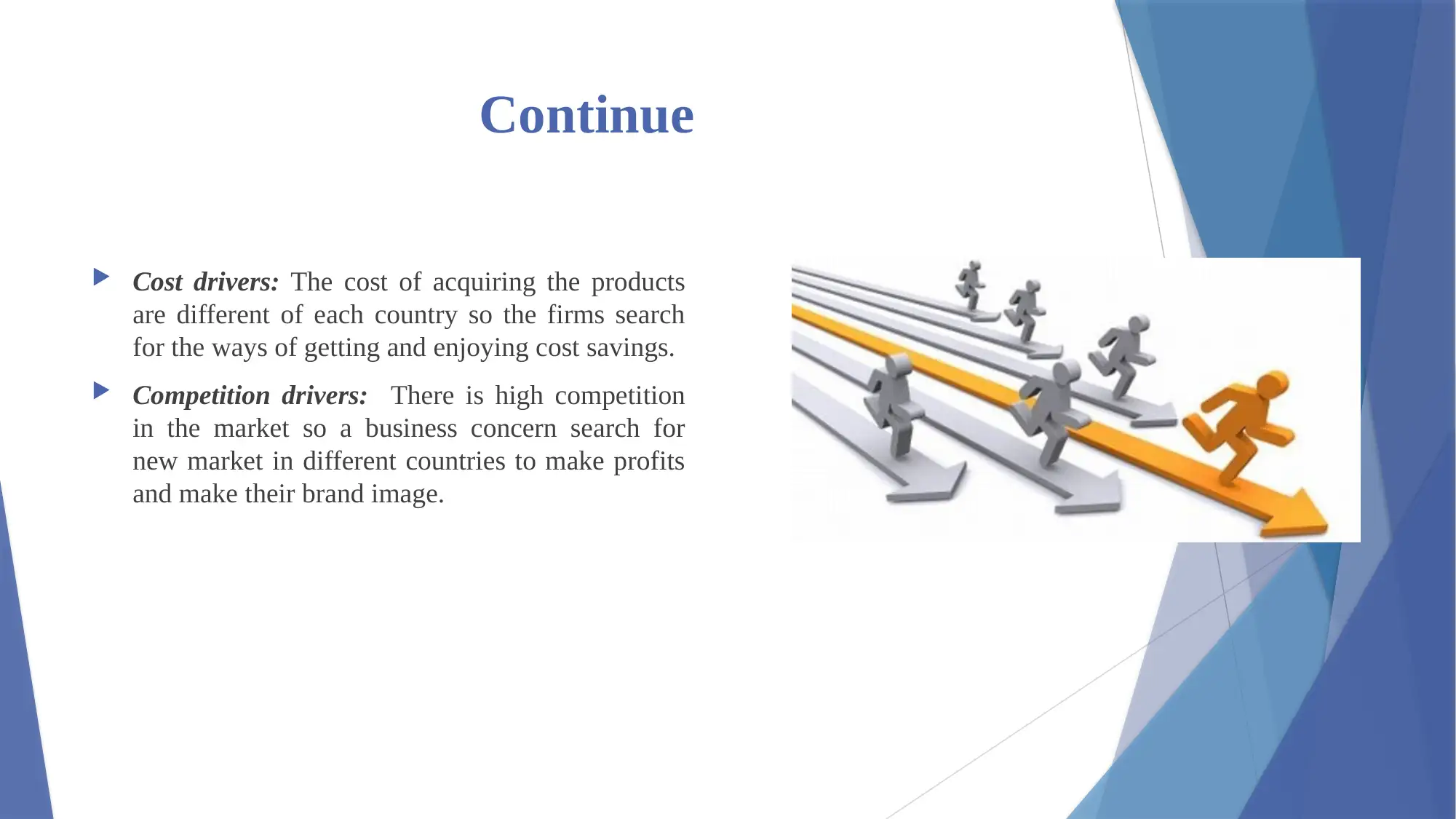
Continue
Cost drivers: The cost of acquiring the products
are different of each country so the firms search
for the ways of getting and enjoying cost savings.
Competition drivers: There is high competition
in the market so a business concern search for
new market in different countries to make profits
and make their brand image.
Cost drivers: The cost of acquiring the products
are different of each country so the firms search
for the ways of getting and enjoying cost savings.
Competition drivers: There is high competition
in the market so a business concern search for
new market in different countries to make profits
and make their brand image.
Paraphrase This Document
Need a fresh take? Get an instant paraphrase of this document with our AI Paraphraser
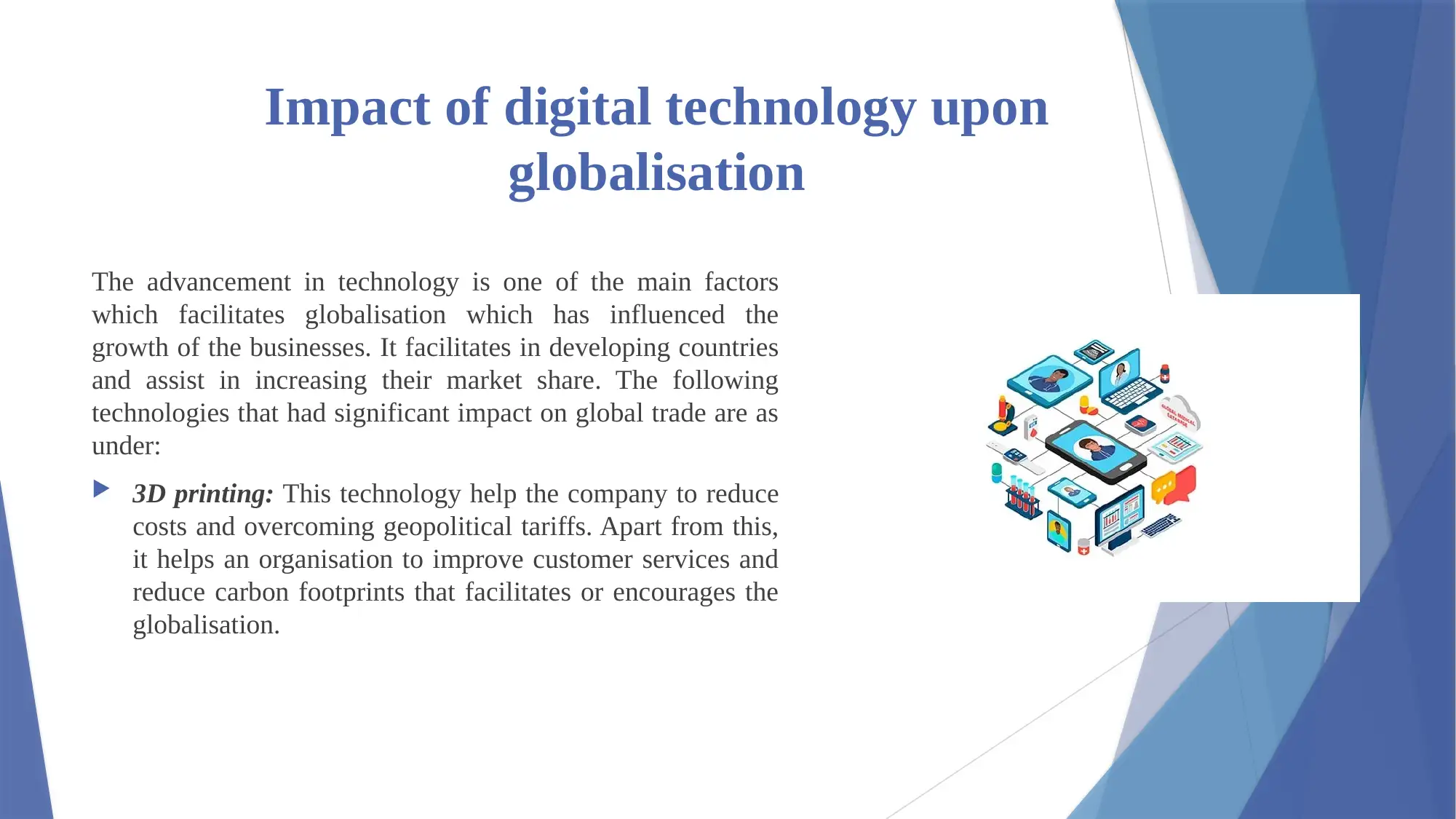
Impact of digital technology upon
globalisation
The advancement in technology is one of the main factors
which facilitates globalisation which has influenced the
growth of the businesses. It facilitates in developing countries
and assist in increasing their market share. The following
technologies that had significant impact on global trade are as
under:
3D printing: This technology help the company to reduce
costs and overcoming geopolitical tariffs. Apart from this,
it helps an organisation to improve customer services and
reduce carbon footprints that facilitates or encourages the
globalisation.
globalisation
The advancement in technology is one of the main factors
which facilitates globalisation which has influenced the
growth of the businesses. It facilitates in developing countries
and assist in increasing their market share. The following
technologies that had significant impact on global trade are as
under:
3D printing: This technology help the company to reduce
costs and overcoming geopolitical tariffs. Apart from this,
it helps an organisation to improve customer services and
reduce carbon footprints that facilitates or encourages the
globalisation.
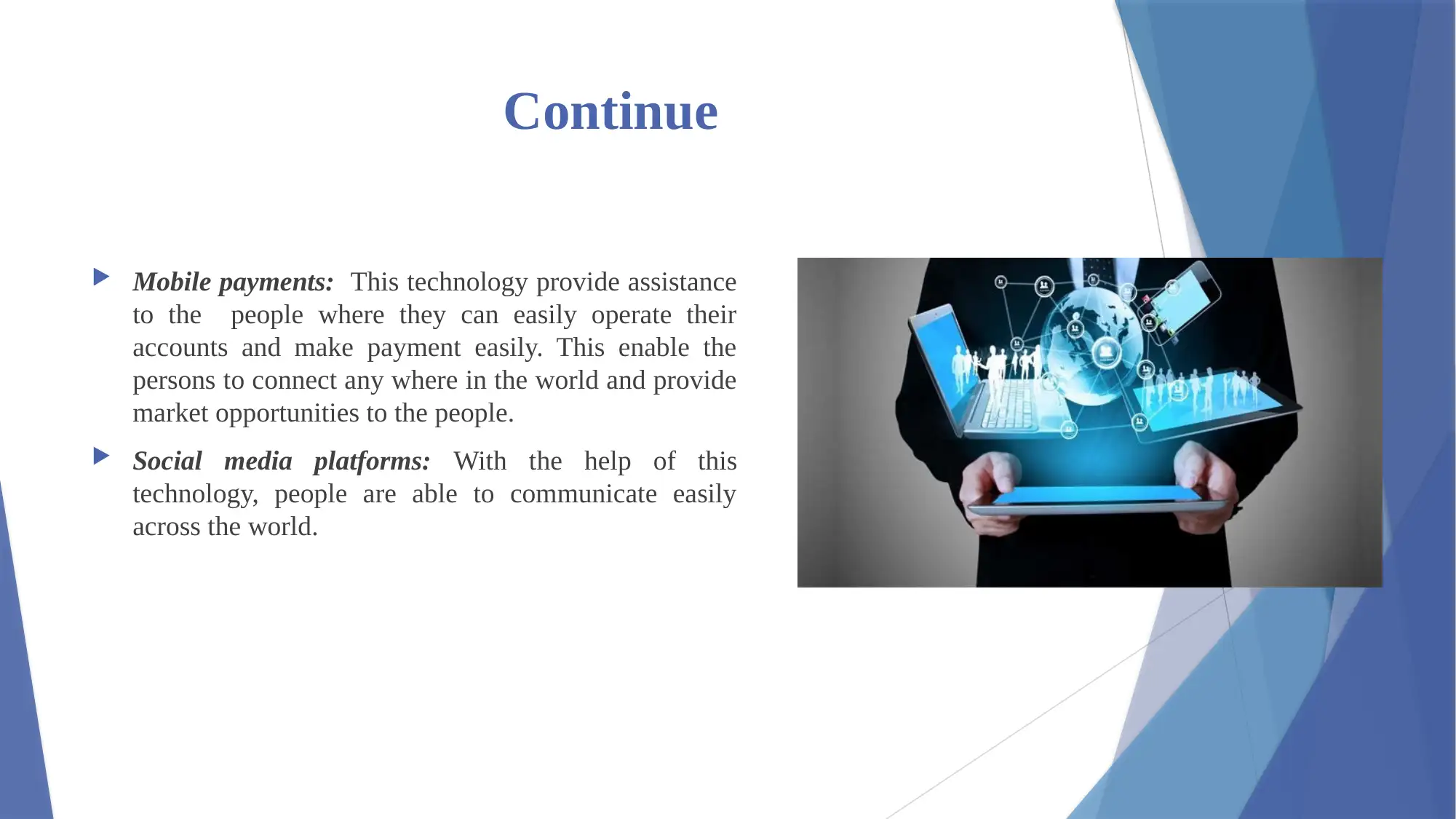
Continue
Mobile payments: This technology provide assistance
to the people where they can easily operate their
accounts and make payment easily. This enable the
persons to connect any where in the world and provide
market opportunities to the people.
Social media platforms: With the help of this
technology, people are able to communicate easily
across the world.
Mobile payments: This technology provide assistance
to the people where they can easily operate their
accounts and make payment easily. This enable the
persons to connect any where in the world and provide
market opportunities to the people.
Social media platforms: With the help of this
technology, people are able to communicate easily
across the world.
⊘ This is a preview!⊘
Do you want full access?
Subscribe today to unlock all pages.

Trusted by 1+ million students worldwide
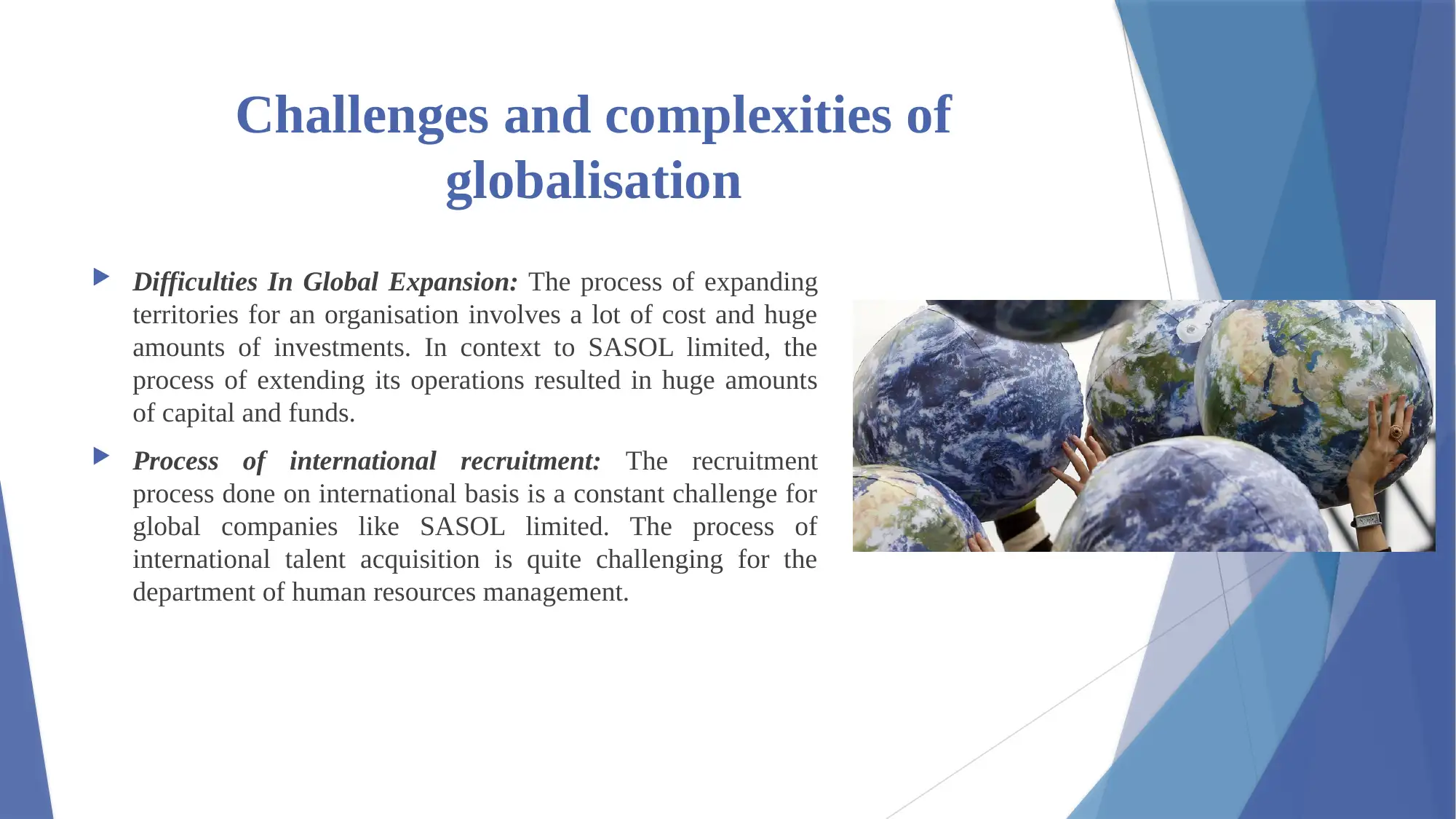
Challenges and complexities of
globalisation
Difficulties In Global Expansion: The process of expanding
territories for an organisation involves a lot of cost and huge
amounts of investments. In context to SASOL limited, the
process of extending its operations resulted in huge amounts
of capital and funds.
Process of international recruitment: The recruitment
process done on international basis is a constant challenge for
global companies like SASOL limited. The process of
international talent acquisition is quite challenging for the
department of human resources management.
globalisation
Difficulties In Global Expansion: The process of expanding
territories for an organisation involves a lot of cost and huge
amounts of investments. In context to SASOL limited, the
process of extending its operations resulted in huge amounts
of capital and funds.
Process of international recruitment: The recruitment
process done on international basis is a constant challenge for
global companies like SASOL limited. The process of
international talent acquisition is quite challenging for the
department of human resources management.
Paraphrase This Document
Need a fresh take? Get an instant paraphrase of this document with our AI Paraphraser
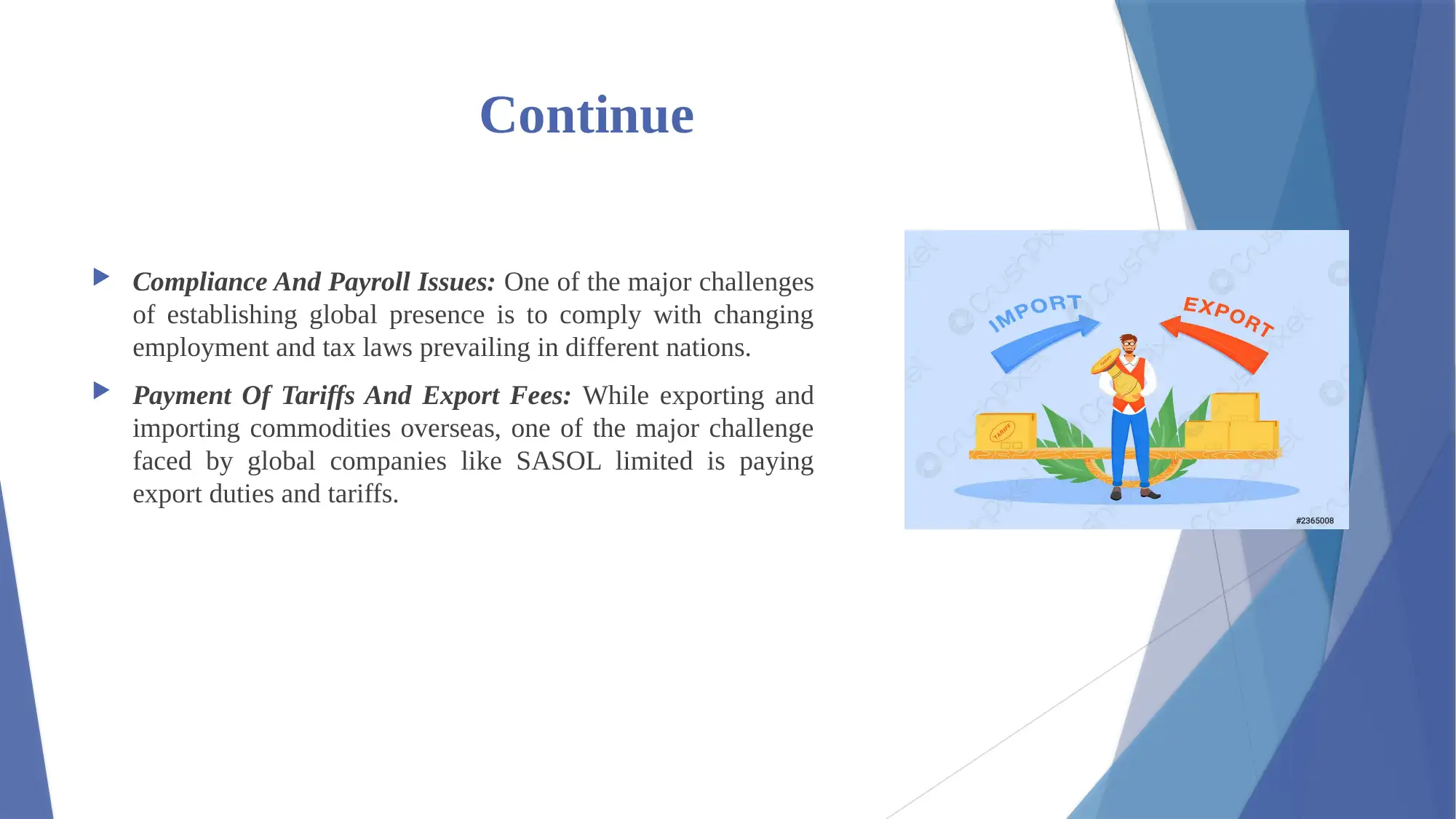
Continue
Compliance And Payroll Issues: One of the major challenges
of establishing global presence is to comply with changing
employment and tax laws prevailing in different nations.
Payment Of Tariffs And Export Fees: While exporting and
importing commodities overseas, one of the major challenge
faced by global companies like SASOL limited is paying
export duties and tariffs.
Compliance And Payroll Issues: One of the major challenges
of establishing global presence is to comply with changing
employment and tax laws prevailing in different nations.
Payment Of Tariffs And Export Fees: While exporting and
importing commodities overseas, one of the major challenge
faced by global companies like SASOL limited is paying
export duties and tariffs.
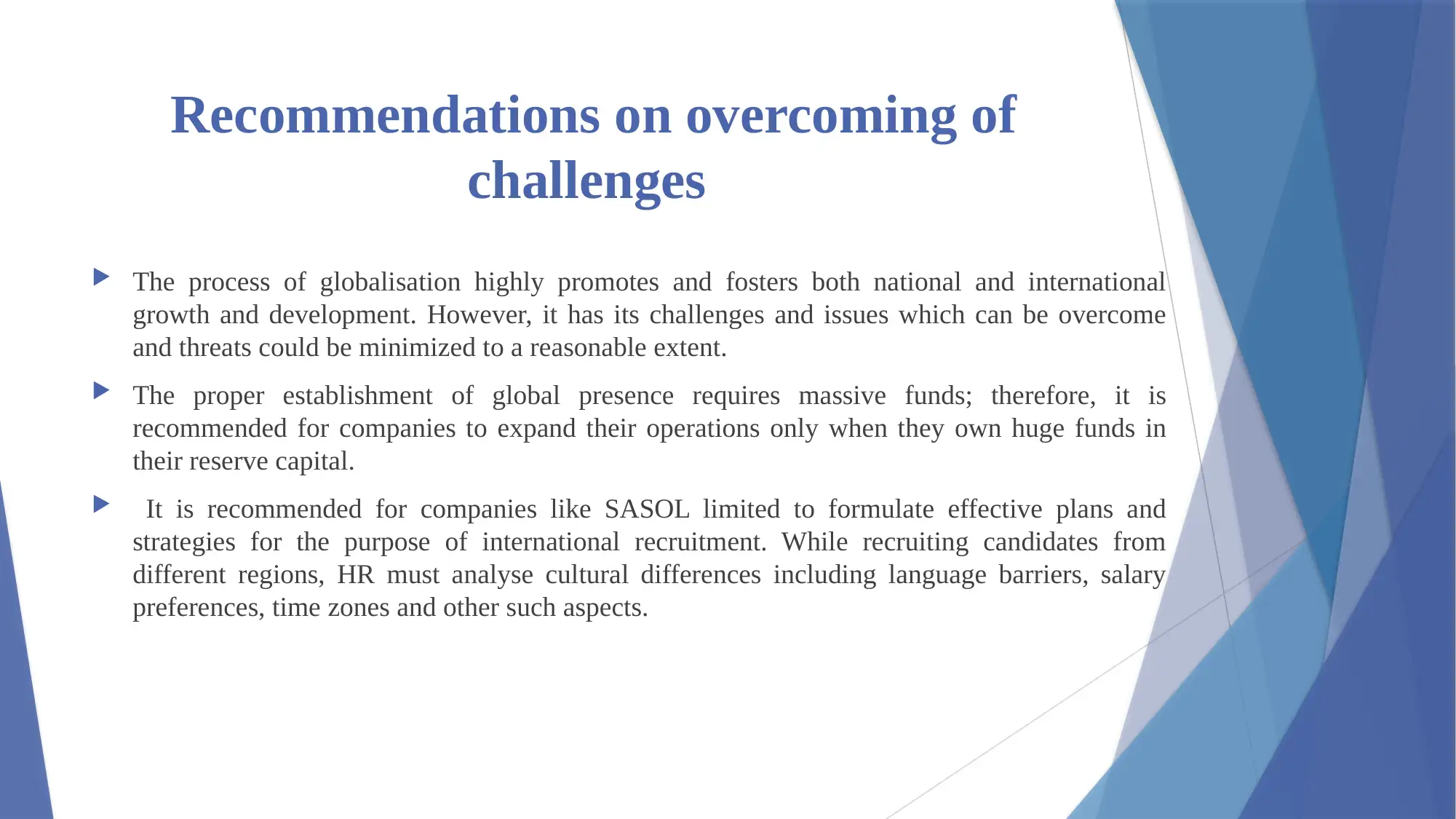
Recommendations on overcoming of
challenges
The process of globalisation highly promotes and fosters both national and international
growth and development. However, it has its challenges and issues which can be overcome
and threats could be minimized to a reasonable extent.
The proper establishment of global presence requires massive funds; therefore, it is
recommended for companies to expand their operations only when they own huge funds in
their reserve capital.
It is recommended for companies like SASOL limited to formulate effective plans and
strategies for the purpose of international recruitment. While recruiting candidates from
different regions, HR must analyse cultural differences including language barriers, salary
preferences, time zones and other such aspects.
challenges
The process of globalisation highly promotes and fosters both national and international
growth and development. However, it has its challenges and issues which can be overcome
and threats could be minimized to a reasonable extent.
The proper establishment of global presence requires massive funds; therefore, it is
recommended for companies to expand their operations only when they own huge funds in
their reserve capital.
It is recommended for companies like SASOL limited to formulate effective plans and
strategies for the purpose of international recruitment. While recruiting candidates from
different regions, HR must analyse cultural differences including language barriers, salary
preferences, time zones and other such aspects.
⊘ This is a preview!⊘
Do you want full access?
Subscribe today to unlock all pages.

Trusted by 1+ million students worldwide
1 out of 14
Related Documents
Your All-in-One AI-Powered Toolkit for Academic Success.
+13062052269
info@desklib.com
Available 24*7 on WhatsApp / Email
![[object Object]](/_next/static/media/star-bottom.7253800d.svg)
Unlock your academic potential
Copyright © 2020–2026 A2Z Services. All Rights Reserved. Developed and managed by ZUCOL.





